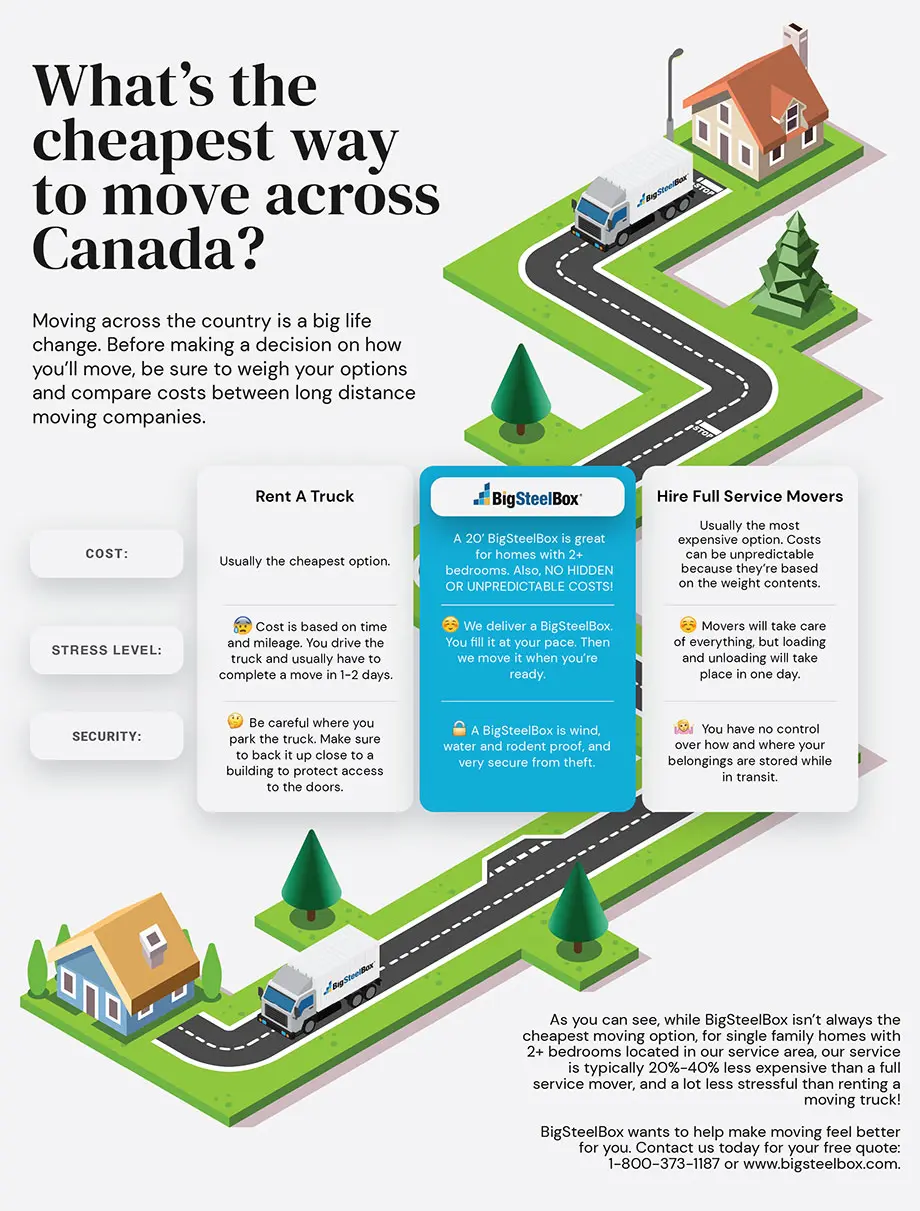Moving From Toronto To New Jersey
Are you considering a move from Toronto to New Jersey? This significant change can be both exciting and intimidating, especially when it comes to navigating the logistics of relocating to a new country. As the sixth-most populous city in the United States, New Jersey offers a unique blend of urban and suburban living, rich history, and unparalleled access to New York City. From finding the right neighborhood to understanding the local culture, there are many factors to consider when making this move. In this article, we'll provide you with a comprehensive guide to help you make a seamless transition.

- Moving from Toronto to New Jersey: A Comprehensive Guide
- Is it worth it to move to New Jersey?
- Is Toronto more expensive than New Jersey?
- What is the cheapest way to move stuff from Canada to the USA?
- How much does it cost to move from Canada to the US?
- FAQ
- What are the main differences in cost of living between Toronto and New Jersey?
- How do I handle healthcare and insurance when moving from Toronto to New Jersey?
- What are the main cultural differences I should be aware of when moving from Toronto to New Jersey?
- What are the job market and career prospects like in New Jersey compared to Toronto?
Moving from Toronto to New Jersey: A Comprehensive Guide
Moving from Toronto to New Jersey can be a significant change, especially when it comes to adjusting to a new climate, culture, and way of life. This guide is designed to provide you with all the necessary information to make your transition as smooth as possible.
Understanding the Differences in Climate
One of the most significant differences between Toronto and New Jersey is the climate. Toronto experiences a humid continental climate with cold winters and warm summers. New Jersey, on the other hand, has a humid subtropical climate with hot summers and cold winters. Be prepared for more humid summers and potentially colder winters in New Jersey.
Cost of Living: Toronto vs. New Jersey
The cost of living in New Jersey is generally higher than in Toronto. Housing costs, in particular, are significantly higher in New Jersey, especially in cities like Hoboken and Jersey City. However, salaries in New Jersey are also higher on average, which can help offset the increased cost of living.
| Category | Toronto | New Jersey |
|---|---|---|
| Housing | $1,800/month (1-bedroom apt) | $2,500/month (1-bedroom apt) |
| Food | $15-20/meal | $20-30/meal |
| Transportation | $100-150/month (public transit) | $200-300/month (public transit) |
Job Opportunities in New Jersey
New Jersey is home to many major industries, including pharmaceuticals, finance, and technology. Many major companies have headquarters or offices in the state, including Johnson & Johnson, Prudential Financial, and Verizon Communications. If you're in one of these industries, you may find many job opportunities available in New Jersey.
Understanding the Different Healthcare Systems
Canada and the United States have different healthcare systems. In Canada, healthcare is publicly funded and generally considered universal. In the United States, healthcare is primarily provided by private companies, and many people receive health insurance through their employers. Be prepared to research and understand the healthcare system in New Jersey and how it may impact your access to healthcare.
Getting Settled in New Jersey
Once you arrive in New Jersey, be sure to take care of the essentials, such as setting up utilities, finding a place to live, and registering your vehicle (if applicable). You may also want to explore your new community, meet your neighbors, and get familiar with local customs and traditions.
Is it worth it to move to New Jersey?

Pros of Moving to New Jersey
Moving to New Jersey can be a great decision for many reasons. One of the strongest economies in the US, New Jersey offers a high standard of living, excellent job opportunities, and a diverse range of industries. Here are some pros to consider:
- Higher salaries: New Jersey has one of the highest average salaries in the country, making it an attractive option for those looking to improve their financial situation.
- World-class education: New Jersey is home to some of the best schools and universities in the country, providing access to quality education for residents.
- Unbeatable location: Located in the heart of the Northeast, New Jersey offers easy access to major cities like New York and Philadelphia, making it an ideal location for those who want to be close to the action.
Cons of Moving to New Jersey
While New Jersey has many advantages, there are also some downsides to consider. Here are some of the cons:
- High cost of living: New Jersey is one of the most expensive states to live in, with high property taxes, housing costs, and living expenses.
- Traffic and congestion: New Jersey is known for its crowded roads and busy highways, which can make commuting a nightmare.
- Weird town laws: New Jersey is famous for its quirky town laws, which can be frustrating for some residents. For example, it's illegal to slurp soup in a restaurant in Newark!
Things to Consider Before Making the Move
Before making the decision to move to New Jersey, here are some things to consider:
- Research the area: Make sure to research the area you're planning to move to, including the cost of living, job opportunities, and local culture.
- Plan your finances: With the high cost of living in New Jersey, it's essential to plan your finances carefully and make sure you have enough savings to cover the expenses.
- Visit before you move: Spend some time visiting New Jersey before you make the move to get a feel for the state and its culture.
Is Toronto more expensive than New Jersey?
The cost of living in Toronto compared to New Jersey is a significant factor to consider when deciding where to live. Generally, Toronto is considered more expensive than New Jersey, but it's essential to break down the costs to understand why.
Housing Costs
One of the primary reasons Toronto is more expensive than New Jersey is the cost of housing. The median home price in Toronto is around $1 million, while in New Jersey, it's around $340,000. Renting is also more expensive in Toronto, with the average monthly rent for a one-bedroom apartment being around $2,000, compared to $1,400 in New Jersey.
Taxes
Taxes are another significant factor contributing to the higher cost of living in Toronto. Ontario, the province where Toronto is located, has a higher sales tax rate (13%) compared to New Jersey (6.625%). Additionally, Toronto has a land transfer tax, which can add thousands of dollars to the cost of buying a home. New Jersey does not have a similar tax.
Daily Expenses
Daily expenses, such as food and transportation, can also vary significantly between Toronto and New Jersey. Here are some examples:
- Food: A meal at a mid-range restaurant in Toronto costs around $20-30 per person, while in New Jersey, it costs around $15-25 per person.
- Transportation: A monthly public transit pass in Toronto costs around $156, while in New Jersey, it costs around $96.
- Gasoline: Gas prices are generally higher in Toronto, with the average price per liter being around $1.30, compared to $1.10 in New Jersey.
These costs can add up quickly, making Toronto a more expensive city to live in compared to New Jersey.
What is the cheapest way to move stuff from Canada to the USA?

The cheapest way to move stuff from Canada to the USA depends on the type and quantity of items, distance, and mode of transportation. Here are some general tips and options to consider:
Shipping by Mail or Courier
Shipping by mail or courier is a convenient and cost-effective way to move small to medium-sized packages from Canada to the USA. USPS, UPS, and FedEx offer competitive rates for international shipping. To get the best deal, compare rates among these carriers and consider using a shipping broker or online platform that can help you find the cheapest option. Here are some tips to keep in mind:
- Check the weight and dimensions of your package to determine the best shipping option.
- Choose a shipping carrier that offers tracking and insurance to ensure your package arrives safely.
- Consider using a shipping broker or online platform to compare rates and find the best deal.
Using a Freight Forwarder
If you need to move a large quantity of items or heavy equipment, using a freight forwarder can be a cost-effective option. Freight forwarders specialize in shipping goods internationally and can help you navigate customs clearance and other logistics. Here are some benefits to consider:
- Freight forwarders have established relationships with carriers, which can result in lower rates.
- They can handle customs clearance and other logistics, saving you time and hassle.
- Freight forwarders often offer insurance options to protect your goods during transit.
Driving or Hiring a Mover
If you need to move a large quantity of items or prefer a more personalized service, driving or hiring a mover can be a good option. Here are some tips to consider:
- Research moving companies that specialize in international moves and compare rates.
- Make sure the moving company you choose has experience with customs clearance and border crossings.
- Consider hiring a moving broker who can help you find the best moving company for your needs.
How much does it cost to move from Canada to the US?

The cost of moving from Canada to the US can vary greatly depending on several factors, including the distance, weight, and type of move. Here are some estimated costs to consider:
Moving Company Costs
The cost of hiring a professional moving company can range from $2,000 to $10,000 or more, depending on the size of the move and the services required. Here are some estimated costs for different types of moves:
- Small Move (1-2 rooms): $2,000 - $4,000
- Medium Move (3-5 rooms): $4,000 - $7,000
- Large Move (6+ rooms): $7,000 - $10,000+
DIY Move Costs
If you're planning a DIY move, the costs will be significantly lower. Here are some estimated costs for a DIY move:
- Rental Truck: $200 - $500 per day
- Fuel: $200 - $500
- Equipment and Supplies: $100 - $300
Additional Costs to Consider
In addition to the moving costs, there are several other expenses to consider when moving from Canada to the US:
- Customs and Duties: $100 - $500
- Insurance: $100 - $500
- Travel and Accommodation: $500 - $1,000
FAQ
What are the main differences in cost of living between Toronto and New Jersey?
When considering a move from Toronto to New Jersey, it's essential to understand the cost of living differences between the two regions. Housing costs in New Jersey are generally lower compared to Toronto, with the median home price in New Jersey being around $340,000, whereas in Toronto, it's around $850,000. However, taxes in New Jersey are higher, with a state income tax rate ranging from 1.4% to 10.75%, compared to Ontario's provincial income tax rate ranging from 5.05% to 13.16%. Additionally, food prices and transportation costs in New Jersey are relatively similar to those in Toronto.
How do I handle healthcare and insurance when moving from Toronto to New Jersey?
When moving from Toronto to New Jersey, it's crucial to understand the differences in healthcare and insurance between the two regions. OHIP (Ontario Health Insurance Plan) will not cover you in New Jersey, so you'll need to obtain health insurance in the United States. You may be eligible for employer-sponsored health insurance through your job, or you can purchase a plan through the Affordable Care Act marketplace. Additionally, you should research healthcare providers in your new area and ensure you have access to necessary medical care.
What are the main cultural differences I should be aware of when moving from Toronto to New Jersey?
Moving from Toronto to New Jersey can be a significant cultural adjustment. Language is not a significant barrier, as both regions predominantly speak English. However, you may notice differences in accents and local dialects. Food culture is also distinct, with New Jersey being famous for its boardwalks and diners, whereas Toronto has a more multicultural food scene. Additionally, commuting habits differ, with more people relying on cars in New Jersey compared to Toronto's extensive public transit system.
What are the job market and career prospects like in New Jersey compared to Toronto?
The job market and career prospects in New Jersey differ from those in Toronto. Industry hubs in New Jersey include pharmaceuticals, finance, and logistics, whereas Toronto is a hub for technology, finance, and healthcare. New Jersey has a lower unemployment rate compared to Toronto, but average salaries are generally higher in Toronto. It's essential to research job opportunities in your field and network with professionals in your industry to understand the New Jersey job market.
